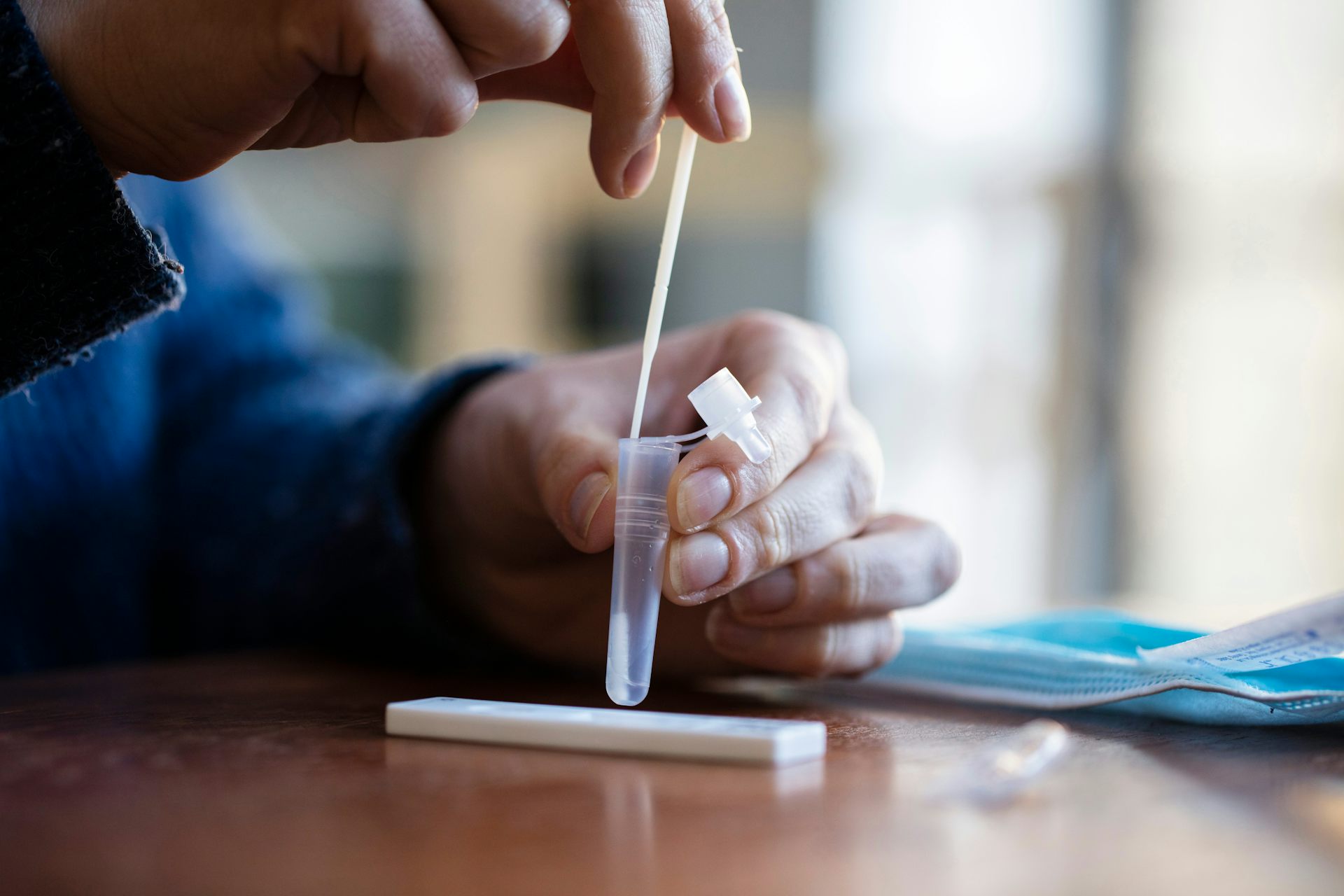How long does immunity last after a COVID infection?
Creationists stuck with the evidence of parasites and viruses that appear to be designed for two purposes only - making more copies of themselves and increasing the suffering in the world by making us sick and die - traditionally try to ride two horses. They blame something else, like 'The Fall' or 'Sin' for them, whilst still arguing that their putative designer god is supreme in all things and the only entity capable of creating complex organisms.
They also get in a terrible muddle when asked whether their 'designer' god included an immune system to protect us from these parasites when it designed us before 'The Fall', in which case it was planning for it all along, or whether there was a subsequent upgrade to V.1.2, in which case it couldn't have been omniscient and had to redo its design to account for the unforeseen.
But whatever rationalisation creationists can think up for these mutually contradictory beliefs, we are left with the fact that viruses like the SARS-CoV-2 virus and our immune system are locked in an arms race, in which human medical science has had to get involved because the immune system isn't fit for purpose, and the protection it gives us is only temporary.
Meanwhile, medical scientists, aware of the fact that evolution by natural selection is going to continually produce new variants of the virus and that these viruses may become better at evading our defences, continue to apply that knowledge and develop new vaccines against the latest variants.
The following article by Lara Herrero, Research Leader in Virology and Infectious Disease, and Wesley Freppel, Research Fellow, Institute for Glycomics, both of Griffith University, Australia explains why regular vaccination with boosters to keep out immune system primed for the latest iteration of the arms race with a latest version of the virus. The article is reproduced from The Conversation under a Creative Commons licence, reformatted for stylistic consistency:

How long does immunity last after a COVID infection?
Lara Herrero, Griffith University and Wesley Freppel, Griffith University
Nearly four years into the pandemic, Australia, like many other countries, is still seeing large numbers of COVID cases. Some 860,221 infections were recorded around the country in 2023, while 30,283 cases have already been reported in 2024.
This is likely to be a significant underestimate, with fewer people testing and reporting than earlier in the pandemic. But the signs suggest parts of Australia are experiencing yet another COVID surge.
While some lucky people claim to have never had COVID, many are facing our second, third or even fourth infection, often despite having been vaccinated. You might be wondering, how long does immunity last after a previous infection or vaccination?
Let’s take a look at what the evidence shows.
B cells and T cells
To answer this question, we need to understand a bit about how immunity to SARS-CoV-2 (the virus that causes COVID) works.
After being infected or vaccinated, the immune system develops specific antibodies that can neutralise SARS-CoV-2. B cells remember the virus for a period of time. In addition, the immune system produces memory T cells that can kill the virus, and remain in the blood for some months after the clearance of the infection or a vaccination.
A 2021 study found 98% of people had antibodies against SARS-CoV-2’s spike protein (a protein on the surface of the virus that allows it to attach to our cells) one month after symptom onset. Six to eight months afterwards, 90% of participants still had these neutralising antibodies in their blood.
This means the immune system should have recognised and neutralised the same SARS-CoV-2 variant if challenged within six to eight months (if an infection occurred, it should have resulted in mild to no symptoms).
But what about when the virus mutates?
As we know, SARS-CoV-2 has mutated over time, leading to the emergence of new variants such as alpha, beta, delta and omicron. Each of these variants carries mutations that are new to the immune system, even if the person has been previously infected with an earlier variant.
A new variant likely won’t be perfectly recognised – or even recognised at all – by the already activated memory T or B cells from a previous SARS-CoV-2 infection. This could explain why people can be so readily reinfected with COVID.

COVID reinfections are common.
The authors found a previous infection provided protective immunity against reinfection with the ancestral, alpha, beta and delta variants of 85.2% at four weeks. Protection against reinfection with these variants remained high (78.6%) at 40 weeks, or just over nine months, after the previous infection. This protection decreased to 55.5% at 80 weeks (18 months), but the authors noted there was a lack of data at this time point.
Notably, an earlier infection provided only 36.1% protection against a reinfection with omicron BA.1 at 40 weeks. Omicron has been described as an immune escape variant.
A prior infection showed a high level of protection against severe disease (above 88%) up to 40 weeks regardless of the variant a person was reinfected with.
What about immunity after vaccination?
So far almost 70 million COVID vaccines have been administered to more than 22 million people in Australia. Scientists estimated COVID vaccines prevented around 14.4 million deaths in 185 countries in the first year after they became available.
But we know COVID vaccine effectiveness wanes over time. A 2023 review found the original vaccines were 79.6% and 49.7% effective at protecting against symptomatic delta infection at one and nine months after vaccination respectively. They were 60.4% and 13.3% effective against symptomatic omicron at the same time points.
This is where booster doses come into the picture. They’re important to keep the immune system ready to fight off the virus, particularly for those who are more vulnerable to the effects of a COVID infection.
Plus, regular booster doses can provide immunity against different variants. COVID vaccines are constantly being reviewed and updated to ensure optimal protection against current circulating strains, with the latest shot available designed to target the omicron variant XBB 1.5. This is similar to how we approach seasonal flu vaccines.

COVID immunity wanes over time – both from infection and vaccination.
It also seems timing is important, as receiving a vaccine too soon after an infection (less than six months) appears to be less effective than getting vaccinated later.
What now?
Everyone’s immune system is slightly unique, and SARS-CoV-2 continues to mutate, so knowing exactly how long COVID immunity lasts is complicated.
Evidence suggests immunity following infection should generally last six months in healthy adults, and can be prolonged with vaccination. But there are exceptions, and all of this assumes the virus has not mutated so much that it “escapes” our immune response.
While many people feel the COVID pandemic is over, it’s important we don’t forget the lessons we have learned. Practices such as wearing a mask and staying home when unwell can reduce the spread of many viruses, not only COVID.
Vaccination is not mandatory, but for older adults eligible for a booster under the current guidelines, it’s a very good idea.
Lara Herrero, Research Leader in Virology and Infectious Disease, Griffith University and Wesley Freppel, Research Fellow, Institute for Glycomics, Griffith University
This article is republished from The Conversation under a Creative Commons license. Read the original article.
This book presents the reader with multiple examples of why, even if we accept Creationism's putative intelligent designer, any such entity can only be regarded as malevolent, designing ever-more ingenious ways to make life difficult for living things, including humans, for no other reason than the sheer pleasure of doing so. This putative creator has also given other creatures much better things like immune systems, eyesight and ability to regenerate limbs that it could have given to all its creation, including humans, but chose not to. This book will leave creationists with the dilemma of explaining why evolution by natural selection is the only plausible explanation for so many nasty little parasites that doesn't leave their creator looking like an ingenious, sadistic, misanthropic, malevolence finding ever more ways to increase pain and suffering in the world, and not the omnibenevolent, maximally good god that Creationists of all Abrahamic religions believe created everything. As with a previous book by this author, "The Unintelligent Designer: Refuting the Intelligent Design Hoax", this book comprehensively refutes any notion of intelligent design by anything resembling a loving, intelligent and maximally good god. Such evil could not exist in a universe created by such a god. Evil exists, therefore a maximally good, all-knowing, all-loving god does not.
Illustrated by Catherine Webber-Hounslow.
Available in Hardcover, Paperback or ebook for Kindle
Illustrated by Catherine Webber-Hounslow.
ID is not a problem for science; rather science is a problem for ID. This book shows why. It exposes the fallacy of Intelligent Design by showing that, when examined in detail, biological systems are anything but intelligently designed. They show no signs of a plan and are quite ludicrously complex for whatever can be described as a purpose. The Intelligent Design movement relies on almost total ignorance of biological science and seemingly limitless credulity in its target marks. Its only real appeal appears to be to those who find science too difficult or too much trouble to learn yet want their opinions to be regarded as at least as important as those of scientists and experts in their fields.
Available in Hardcover, Paperback or ebook for Kindle







It has now been almost 4 years since this Covid pandemic started and the danger it poses is on a worldwide basis. It's absolutely horrifying how fast this disease has spread throughout the entire world. Some people believe this disease was spread into the world intentionally by some evil humans while others think its just the amoral forces of Nature taking its course. Either way its a horrible disease and has ruined countless lives. People are still wearing masks almost 4 years later. There's still no end in sight. There's still no light at the end of the tunnel. Heaven help us would be an appropriate thing to say, but the sad fact is Heaven isn't going to help us. Our imaginary all good, all mighty, all wise God of love and mercy cannot help us and cannot save us. There's no superhero to save us. There's no Superman to save us.
ReplyDeleteSome Christians believe that this Covid is God punishing us for our sins. This is a very cruel inhumane way to punish human sin. It's also claimed by some Christians that taking the vaccine is dangerous not because of possible side effects but because they believe that the vaccine has been tampered with by high level Satanists and is secretly encoded with the number 666. These religious nutters think the end of the world is near and Satanists are running the planet. These conspiracy theorists are taking the books and movies Rosemary's Baby and The Omen too seriously. They believe the Devil is influencing everything and is everywhere whether it's politics, the media, music, the movies, the banks, the medical industry, TV shows, commercials, government. What these Christians don't seem to be asking and what they are forgetting is that God is supposed to be stronger and smarter than Satan. What they don't ask is why their so called all good, all mighty, all wise loving God is allowing the Devil to cause all this havoc. A God who allows Satan and evil to wreak havoc in the world? Is this God like behavior? Something is not right with this picture.